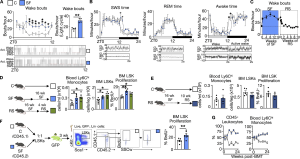In a recent paper, researchers have described how a consistent lack of sleep can have significant negative effects on your immune system, with harmful affects observed in immune cells, leading to inflammatory disorders and cardiovascular disease (Figure 1). Interestingly, catching up on sleep does not reverse the negative effects and by losing up to an hour of sleep a night will increase the risk of certain disorders.

Figure 1: Sleep exerts a prolonged influence on hematopoiesis. (A) Quantification of wake bouts (transitions from sleep to wake states), during the resting (light) period along with a representative hypnogram in control (C) and SF mice. n = 4 mice per group. (B) Quantification of minutes per hour in SWS, REM sleep, and awake time, along with representative EEG and EMG traces, in control and SF animals over 24 h. n = 4 mice per group. (C) Quantification of resting period wake bouts over 16 wk of SF followed by 10 wk of RS. n = 4 mice per group. (D) Enumeration of blood Ly6Chi monocytes and BM LSKs, along with LSK BrdU incorporation in control mice, SF mice, and mice exposed to 16 wk of SF followed by 4 wk of RS. n = 5–6 mice per group. (E) Enumeration of blood Ly6Chi monocytes and BM LSKs, along with LSK proliferation in a distinct cohort of control mice and mice exposed to 16 wk of SF followed by 10 wk of RS. n = 4 mice per group. (F) BrdU incorporation into LSKs from control (CD45.1) or SF (CD45.2) mice 3 wk after competitive 1:1 LSK transplantation into a UbiGFP mouse sleeping habitually. n = 6–7 mice per group. (G) Competitive 1:1 transplantation of LSKs from control (CD45.1) or SF (CD45.2) mice into UbiGFP recipient mice and quantification of CD45.1/2 chimerism among blood leukocytes and Ly6Chi monocytes up to 24 wk after transplantation. n = 8 mice per group. Mean ± SEM. *, P < 0.05, **, P < 0.01.
In this paper they were able to show how sleep alters the DNA structure of certain immune cells which can have an effect on the immune system. They were able to identify and describe the biological mechanisms that are the bridge between sleep and immunological health, highlighting how lack of sleep will influence and have long-lasting effects on the activity and production of immune cells.
Their findings also showed that sleep recovery was not able to negate the effects of disrupted sleep, highlighting the effects of disrupted sleep in both humans and animals. The immune cell ageing brought on by lack of sleep may be an important contributor to inflammatory and cardiovascular disease.
Journal article: McAlpine, C.S., et al. 2022. Sleep exerts lasting effects on hematopoietic stem cell function and diversity. Journal of Experimental Medicine.










